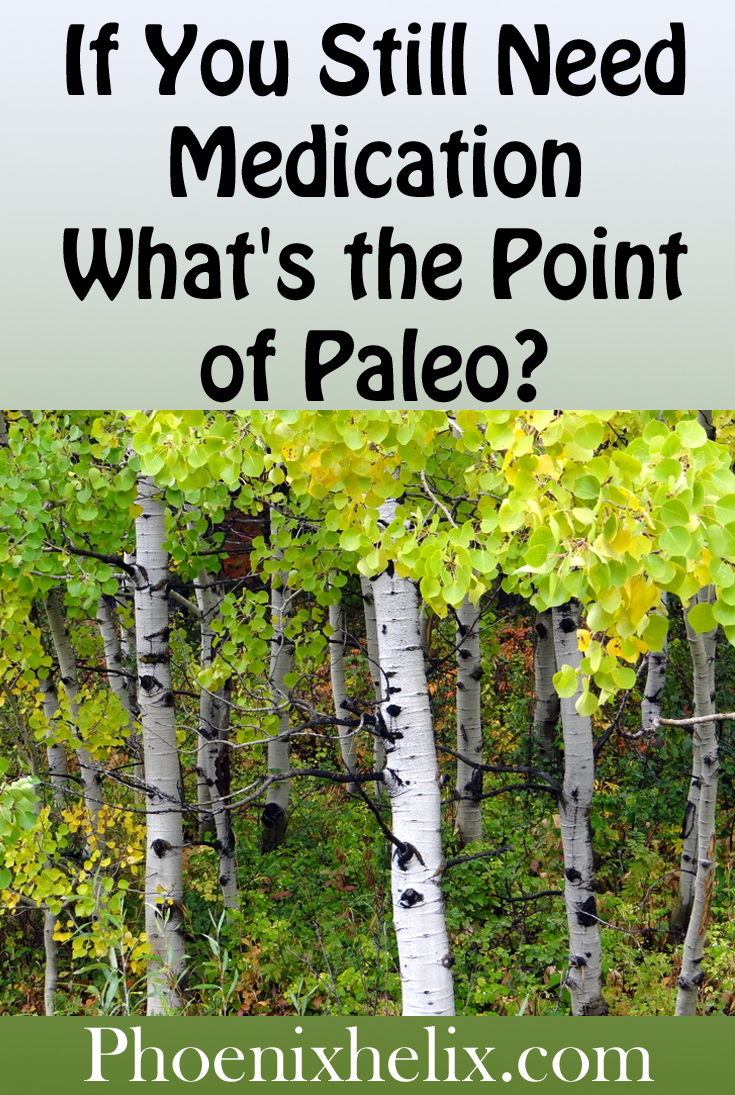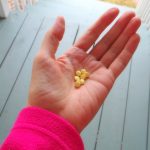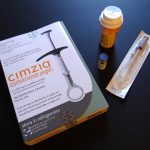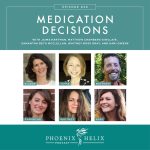“Understanding the difference between healthy striving and perfectionism is critical to laying down the shield and picking up your life.”
~ Brené Brown
The Question
When I first turned to the paleo autoimmune protocol (AIP), I wanted to avoid immunosuppressant medication. In fact, I don’t know if I would have embarked on such a challenging diet if I hadn’t held onto this hope. 4 years later, I realized that for me, diet and lifestyle changes weren’t enough on their own, so I made the difficult choice to go on medication. Now, I’m in remission through a combination of medication, diet and lifestyle, and I have no regrets. Some of you might wonder: What’s the point of paleo if you still need medication? I answered this question myself in my prior posts, but I thought it would be helpful to ask some of my friends and colleagues the same question. Here are their answers. (Note: This doesn’t mean everyone needs medication, but if you do, you’re not alone.)
Answers from the Voices of Experience

Diagnosis: Hashimoto’s Thyroiditis, Fibromyalgia, Lichen Planus, and Psoriasis
Medication: Compounded slow-release bio-identical T4 and T3
“The goal of The Paleo Approach for autoimmune disease is to provide the nutritional resources and opportunity for the immune system to regulate itself and the body to heal. It’s a complementary approach, which means that, while it can sometimes be sufficient on its own to put autoimmune disease into remission, it doesn’t automatically negate the need for medication or additional therapies. Autoimmune medication can span the gamut from supplements recommended by a healthcare professional (eg. adaptogens for adrenal fatigue; high-dose probiotics to restore gut flora), to prescription drugs that support endocrine organs damaged by autoimmune attacks (eg. taking insulin if you’re type 1 diabetic), to disease modifying drugs that help to suppress an overactive immune system (eg. methotrexate or prednisone for a flare). The need for these medications isn’t failure to “AIP hard enough”, and just because we might need to take medications doesn’t mean following the AIP is pointless. The nutrient-focused anti-inflammatory structure of the AIP diet and lifestyle can help prevent/reduce further damage to organs and tissues, may help prevent development of additional autoimmune diseases, can mitigate drug side effects, can reduce the dosage needed of specific drugs, can reduce the number of drugs needed, can decrease recovery time after a flare, can sustainably improve quality of life beyond what drugs can accomplish, and can help support long-term health in ways that go beyond dealing with autoimmune disease.”

Diagnoses: Type 1 Diabetes
Medication: Insulin
“As a Type 1 diabetic, I am extremely thankful for the miracle of modern medicine as it allows me to live each day! When I was first diagnosed, I was told that it didn’t matter what I ate, as long as I took the right amount of insulin, however I quickly discovered that was not the case. Eating real food, gluten and grain-free, has played a huge role in managing my disease and truly allows me to thrive all day long rather than being a slave to my blood sugar. Emotions, positivity, eliminating stress and choosing non-toxic products has also greatly affected my blood sugar and health in general. I think both medicine and nutrition have a place in the world and when both are in balance, the end result can be a beautiful picture.”

Diagnoses: Graves’ Disease & Hashimoto’s Thyroiditis
Medication: Methimazole and Levothyroxine
“In my case, medication just wasn’t enough. One pill kept my heart rate down, another put a damper on my thyroid hormones, but I still had debilitating hives and eczema which steroids barely touched. I was also severely depressed and exhausted. As soon as I switched to AIP, everything started clearing up. Doctors and medication don’t address the underlying inflammation that accompanies autoimmune disorders, but AIP can help. I still flare, but less often and with less severity, and when I do need medication, I know it’s not a failing – and I know I have the tools to help myself heal in my kitchen.”

Diagnoses: Takayasu’s Arteritis
Medication: Imuran
“I like to think of medication as part of a complementary relationship, and not an either/or solution. Like it or not, my body still requires some medication in order to function, and I don’t have control over that. But there are things I am able to control – what I eat, how much I sleep and exercise – which often influence how I feel much more than the medication I take. This balance puts my best foot forward, so that my healthy lifestyle and necessary medication are optimal.”

Diagnoses: Necrotizing Myopathy, Systemic Scleroderma, Raynaud’s, and Mixed Connective Tissue Disease
Medication: Mychophenolate and Low-Dose Naltrexone
“While I wasn’t able to go off my medication altogether, the AIP diet has helped me reduce my meds dramatically. It also keeps me healthy. While the cold and flu season seems to rage on all around me, I remain flu and cold free, and my environmental allergies have disappeared, too. Paleo also allows me to live a much better life than before. It has been nearly 10 years now of battling this disease, and for a time it really limited my activities. Now, I am able to enjoy being a very active grandma and golfer again. If there was anyone who did not want to be on meds, it was me! However, I learned I do best with a combination of the AIP diet and medication. This does not mean I have failed. Medication is simply another tool along with diet to help me live a more active and prosperous life.”

Diagnoses: Ulcerative Colitis
Medication: Imuran and Entyvio
“The way I understand paleo to work is to help your body function at its best. That means helping your mind work better, your body work better, and your medicines work better. Doubting paleo with medicine puts a lot of pressure on the medicine to be the end-all-be-all. Why can’t medicine and paleo hold hands and work together? Another reason I believe paleo has a purpose with medication is that eating gives you control. With medicine, the patient doesn’t always have a say. We must take the medication as prescribed. With paleo, you can personalize your own diet, you can eat different things on different days, you can tweak, alter, and adapt day by day. And you don’t have to wait a month for a doctor appointment!”

Diagnoses: Lupus, Celiac Disease, and Mixed Connective Tissue Disease
Medication: Plaquenil
“My personal trainer suggested that I try the AIP diet for 6 months and track my symptoms. During those six months of AIP along with some lifestyle changes (deep breathing exercises and meditation) I learned a lot about how food and lifestyle affects my body and mind. During reintroductions, I discovered that certain foods triggered digestive disruptions and increased my anxiety. For me it was egg whites, ghee, gluten-free oatmeal, walnuts, sugar-free substitutes, carrageenan, and coffee/black tea. On the other hand, I was pleasantly surprised when I reintroduced legumes with no issues – I had been avoiding those for years. Without doing this experiment, I would never have learned about my personal trigger foods, or that I would end up liking beef liver!”

Diagnoses: Ankylosing Spondylitis
Medication: Simponi
“Eating a paleo style diet or following the autoimmune protocol in conjunction with medication allows the body to be supported still in a holistic way. The body is burdened by medication and the immune system suppressed. By continuing to focus on a healing diet, we are better able to support our bodies foundationally to continue to function optimally. It was this combination that allowed me to see major shifts for myself that I otherwise wasn’t seeing with medication alone.”

Diagnoses: Multiple Sclerosis
Medication: Tysabri
“How I conceptualize the benefits of medication and AIP is that my medication took me about 50% of the way, and AIP took me the rest of the way. Medication halted progression of my multiple sclerosis lesions (as evidenced by MRIs) but AIP helped me to feel better physically by decreasing pain and fatigue. At this point, I can’t imagine my life without either treatment. But one day I hope to manage my MS with AIP alone!”

Diagnoses: Hashimoto’s Thyroiditis & Celiac Disease
Medication: Compounded sustained-release T3 and T4
“I went on the Autoimmune Protocol for a year before I started medication, and although I recovered my symptoms by 75% there was still a ways I had to go to feel normal again. In Hashimoto’s disease specifically, the thyroid is often no longer able to make enough thyroid hormone. Even if diet and lifestyle are able to stop or reduce inflammation, the thyroid damage is still there, and many people like me need to support their bodies with the thyroid hormone they no longer make enough of. It took a year to dial in the right type and dose of thyroid medication that was right for me, but once I found it I was able to resolve all of my lingering thyroid symptoms.”

Diagnosis: Crohn’s Disease
Medication: Mesalamine (and occasionally Prednisone during flares)
“Medication and diet/lifestyle changes are both tools that I use to achieve my goal: Living the healthiest life that I can. I embarked on my paleo/AIP journey hoping for a miracle cure for my Crohn’s disease. Inspirational stories on the internet made me believe that if I just followed the diet closely enough I would be better in no time! To my initial disappointment, while many of my symptoms were diminished by my dietary changes, I was far from the picture of health that I had dreamed. For me, health means having the strength and desire to do what I love. Sometimes that means I need medication to treat my pain or inflammation in addition to making healthy choices every day. Health is not something that I “have,” but rather something that I work on and continue to improve every day!”

Diagnoses: Rheumatoid Arthritis & Fibromyalgia
Medication: Methotrexate
“While the meds keep the rheumatoid arthritis managed, they did nothing to help with my fibromyalgia symptoms. Following a paleo diet/lifestyle helps me manage both pain and fatigue. When I am doing a good job sticking to clean food, I don’t need to take NSAIDs anymore. Additionally, a paleo diet helps me sleep better, have more energy, and maintain a more positive mental and emotional state.”
Disclaimer
This website has a disclaimer on its legal page that is always in effect, but since this article speaks of medication, I want to remind everyone that I’m neither a doctor nor a dietitian. This blog is designed to chronicle my own health journey, share what I learn in the process, and connect with others on a similar path. Always make medical decisions in consult with your doctors. My blog is not meant to be a substitute for medical advice.
You May Also Be Interested In










Thank you so much for this post, and your recent post regarding your own journey with accepting the need to compliment diet with medication. I have reactive arthritis and have been following the AIP diet (and your inspirational blog!) for 1.5 years. For the past month, I’ve been struggling with a flare (costochondritis, sciatic pain, and iritis). I was saddened, frustrated, and disappointed that diet alone wasn’t enough and I need to be on medication. The AIP journey can be very lonely, even more so when a person experiences a flare. It does make a person (and their support network) question, “Why follow AIP/paleo diet?” Thank you for once again reminding me that I am not alone! I do know that my inflammation is not as bad this time, and my body is responding more quickly to meds. I credit this to the AIP diet. It is so reaffirming to know that others have had a similar experience, and to know that experiencing a flare doesn’t mean I failed.
Hi Suzanne. Thank you so much for sharing your story. You are definitely not alone. May your flare pass quickly.